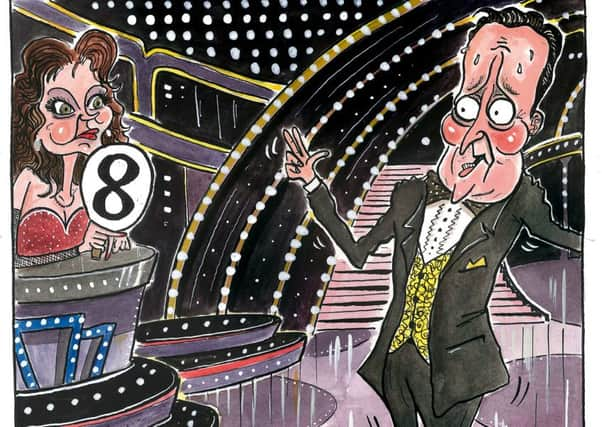Jayne Dowle: Strictly speaking, can David Cameron score 10?


When David Cameron became leader of the Conservative party a decade ago yesterday, do you think he ever imagined he would be ordering air strikes on Syria?
The particular brand of Conservatism he offered appeared as non-confrontational as possible. He forged his leadership by appealing to us all, not just the Tory hang ‘em and flog ‘em hardcore. And he knew what getting embroiled in Iraq had done for Tony Blair.
Advertisement
Hide AdAdvertisement
Hide AdSo far, he has handled a difficult situation with dignity and managed to pull together unity not just in his own party, but across the House of Commons. In context, the swing towards Labour in the Oldham by-election should not be seen as too much of a distraction. Never in a million years were the Tories going to win this seat.
The present shambles of the Opposition’s stance has thrown his own leadership into positive relief. In comparison to the civil war on Jeremy Corbyn’s watch, it’s positively peaceful in the Conservative camp.
Events, dear boy, are presenting an interesting time for us to judge him. How has he done in the job? What mark would we give him out of 10?
We can’t decide on election results and opinion polls alone. We must look at the man himself and what he has achieved personally. Two positive General Election results only tell part of the story. Anyway, “David Cameron” has never won any election all by himself. His constituents continue to support him as their Parliamentary MP (with a current majority of 25,155, the highest in his political career), but it is wrong to assume that he automatically has a mandate to rule over us all.
Advertisement
Hide AdAdvertisement
Hide AdThe decline of tribal voting patterns has made his job even more difficult; he cannot take for granted the automatic support for a Tory leader his predecessors might have enjoyed from party faithful.
These days, especially with the rise of right-wing challengers such as Ukip, the very concept of loyalty is under serious review. That he has managed to steer his party through choppy waters over Europe must earn him good marks.
What though of his achievements closer to home? I’m going to give him what teachers like to call a “praise sandwich” – two pieces of positive feedback with a rather more unpalatable truth in the middle. The first positive is that he has turned out to be more of a likeable leader than many of us expected. He’s had his share of posh Tory boy skits, but the most vitriolic seem to be reserved for his wingman next door in Downing Street, George Osborne, Chancellor of the Exchequer, and heir apparent to an Irish baronetcy.
Although the “call me Dave” chumminess of his early years has worn wearily thin, Cameron possesses the rare quality of delivering unwelcome and difficult news without such news possessing him. This has been especially prescient on matters of the economy. Again though, he chose wisely by picking an armour-plated Chancellor who seems to deflect bullets without even blinking. Ever.
Advertisement
Hide AdAdvertisement
Hide AdCameron has been derided for his background in public relations, yet over the decade we have known him he has never succumbed to the lure of spin which tarnished Tony Blair. There have been irritating moments. Those gruesome date nights, Easyjet holidays and the intimate snaps of the Camerons’ kitchen we could have done without.
Yet he has generally come across as genuine and as much a man-of-the-people as it is possible for an Eton and Oxford-educated son of a stockbroker to be. I suspect he has more “emotional intelligence” than pure “intellect”. This is no bad thing in a leader. It helps him to be human, a quality which some of his political challengers inside and outside the party lack. Ed Miliband and his team clearly under-estimated this at the General Election, to their cost.
However, and here it comes… he does have a knack of passing the buck. You could say that as leader, it is his prerogative. Think though of the difficult domestic matters; health, education, benefits, the North. With all these, he has stepped away and let others run the show (or take the flak, depending on where you are standing).
He would probably call it effective delegating. Some of us might prefer to regard it as self-preservation. The net result is that we rarely feel his true political passions. This is one of the reasons why his comment about “terrorist sympathisers” caused such ructions, so measured are his usual responses.
Advertisement
Hide AdAdvertisement
Hide AdIf in my feedback, I was to suggest where he might improve, I’d say I want to see him shout up rather more about what he believes in. In his favour, I think the time to do this is coming. If I was to summarise his record as leader so far, and award him a mark out of 10 it would be a fair eight. The coming weeks and months might just give him the chance to prove whether he’s worthy of a 10.